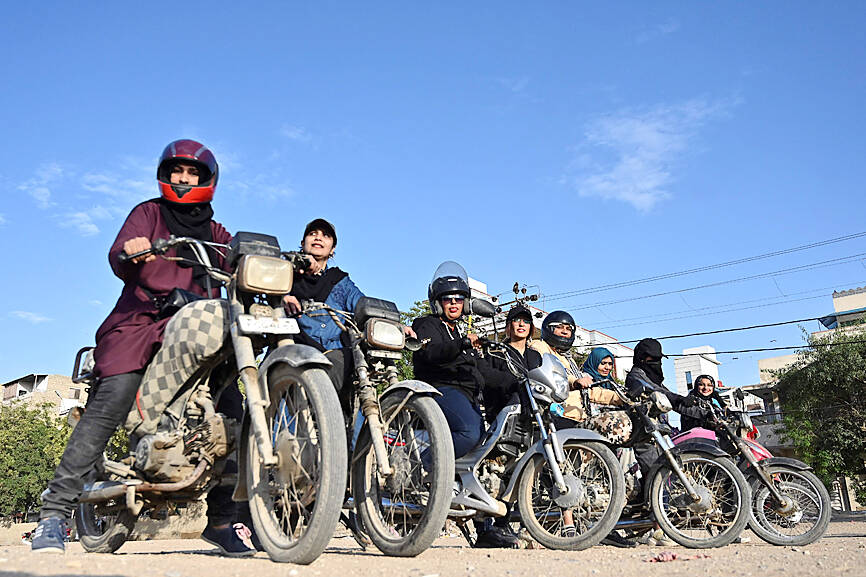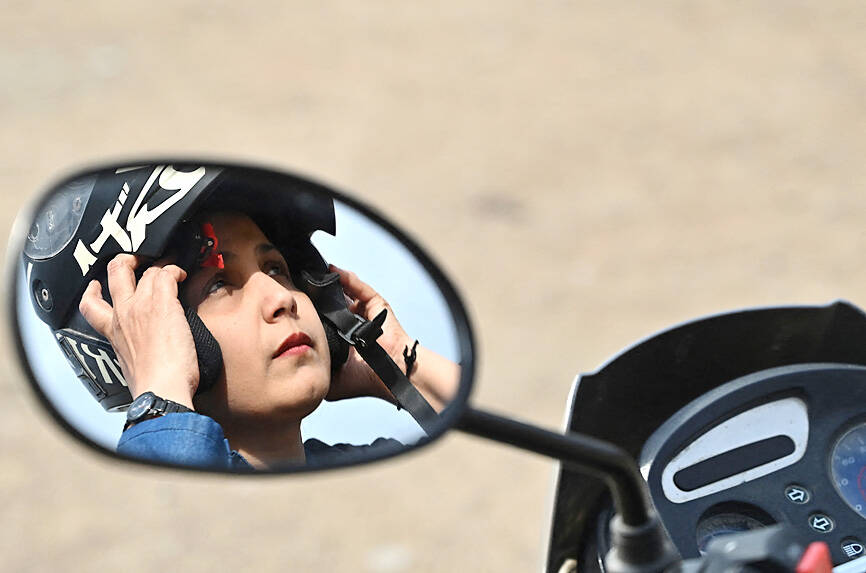Revving round a dusty oval in the heart of Pakistan’s largest city, women on motorbikes practice looping a row of safety cones, their helmets securing colorful headscarves in place.
It is a rare sight in Pakistan, where women are typically relegated to the back seats of cars or to riding side-saddle on motorbikes, ferried by a male relative.
“Change is under way,” said Zainab Safdar, demonstrating how to mount a two-wheeler while cloaked in a pink body-covering abaya.

Photo: AFP
The 40-year-old is an instructor for the Rowdy Riders, a women-only group teaching novices in Karachi everything from the basics of balancing on a bicycle to high-octane gear changing and negotiating traffic.
Since being founded in 2017 by a handful of pioneering riders, the self-described Rowdies have swollen in number to more than 1,500 housewives, students and professionals.
“In the past, there were misconceptions about girls riding bikes,” Safdar said, referring to doubts about their abilities. “Fortunately, with greater awareness, these notions have been dispelled.”

Photo: AFP
Women’s participation in the workforce is affected by the limited availability of public transport services that ensure their safety. In the sprawling megacity, granting women the skill and confidence to join legions of male bikers in the helter-skelter of congestion unlocks a new tier of freedom.
Most of the riders hail from Karachi’s middle class, but tradition often still holds sway.
University lecturer Shafaq Zaman said that “it took a while to get permission” from her family to start classes to master a pedal bike two months ago.
Among the few dozen bikers assembled under the mid-afternoon sun, she looks on with her seven-year-old daughter Aleesha as a convoy of women open up their engines and rip past in a haze of dust.
“I am so inspired that now I have my own dream for me, that I want to ride on a heavy bike. I want to ride the whole of Pakistan,” 30-year-old Zaman said.
Her story is not unusual. In Pakistan, very young boys are often seen steering motorbikes, but many of the Rowdies did not learn to ride a bicycle until well into adulthood.
“There should be a bike in every house and usually there is, but it’s rotting because men do not use it and women don’t know how to,” Sana Kamran said.
“If women can manage household responsibilities and earn a living, why can’t they ride a bike for their convenience?” the 41-year-old asked.
Motorbikes are ubiquitous across Pakistan — most commonly red Honda models or cheaper Chinese reproductions, considered capable of mastering any terrain.
The quest to conquer a bike has seen 26-year-old Farwa Zaidi sustain multiple bone fractures — but the injuries are a badge of honor she wears as proudly as the Rowdy Riders crest on her jacket.
“Here I am, standing strong,” she said alongside her electric scooter.
At 1.37m tall, Zaidi said her small stature made it difficult to claim a spot on crammed city buses.
Learning to ride gave her a new sense of possibility, she said.
“Once we master cycling, it instils a new-found confidence in our ability to conquer other challenges,” she added.

‘UNUSUAL EVENT’: The Australian defense minister said that the Chinese navy task group was entitled to be where it was, but Australia would be watching it closely The Australian and New Zealand militaries were monitoring three Chinese warships moving unusually far south along Australia’s east coast on an unknown mission, officials said yesterday. The Australian government a week ago said that the warships had traveled through Southeast Asia and the Coral Sea, and were approaching northeast Australia. Australian Minister for Defence Richard Marles yesterday said that the Chinese ships — the Hengyang naval frigate, the Zunyi cruiser and the Weishanhu replenishment vessel — were “off the east coast of Australia.” Defense officials did not respond to a request for comment on a Financial Times report that the task group from

DEFENSE UPHEAVAL: Trump was also to remove the first woman to lead a military service, as well as the judge advocates general for the army, navy and air force US President Donald Trump on Friday fired the chairman of the Joint Chiefs of Staff, Air Force General C.Q. Brown, and pushed out five other admirals and generals in an unprecedented shake-up of US military leadership. Trump wrote in a post on Truth Social that he would nominate former lieutenant general Dan “Razin” Caine to succeed Brown, breaking with tradition by pulling someone out of retirement for the first time to become the top military officer. The president would also replace the head of the US Navy, a position held by Admiral Lisa Franchetti, the first woman to lead a military service,

Chinese authorities said they began live-fire exercises in the Gulf of Tonkin on Monday, only days after Vietnam announced a new line marking what it considers its territory in the body of water between the nations. The Chinese Maritime Safety Administration said the exercises would be focused on the Beibu Gulf area, closer to the Chinese side of the Gulf of Tonkin, and would run until tomorrow evening. It gave no further details, but the drills follow an announcement last week by Vietnam establishing a baseline used to calculate the width of its territorial waters in the Gulf of Tonkin. State-run Vietnam News

Four decades after they were forced apart, US-raised Adamary Garcia and her birth mother on Saturday fell into each other’s arms at the airport in Santiago, Chile. Without speaking, they embraced tearfully: A rare reunification for one the thousands of Chileans taken from their mothers as babies and given up for adoption abroad. “The worst is over,” Edita Bizama, 64, said as she beheld her daughter for the first time since her birth 41 years ago. Garcia had flown to Santiago with four other women born in Chile and adopted in the US. Reports have estimated there were 20,000 such cases from 1950 to